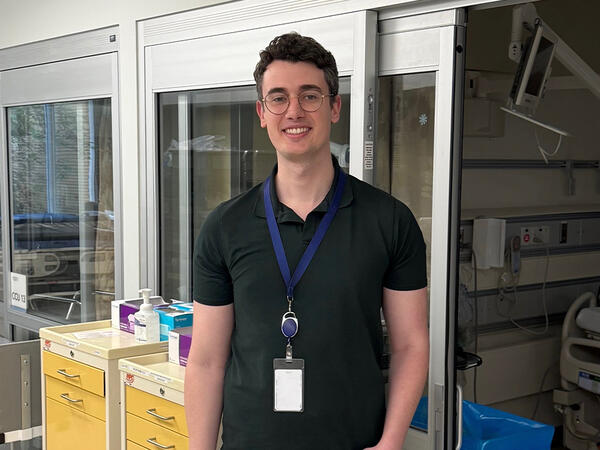Sara Guilcher and team will co-create toolkit in collaboration with people with spinal cord injury
People with spinal cord injury often have complicated medication regimens, which can be overwhelming and difficult to integrate into everyday life. They often have a lot of questions related to their medications and struggle with conversations related to medication concerns with their health care providers.
To help address these concerns, Sara Guilcher, Associate Professor at the U of T’s Leslie Dan Faculty of Pharmacy, and a team of researchers and trainees with expertise in disability, self-management and quality of life, will develop a toolkit in collaboration with people with spinal cord injury to help with medication self-management. The project is funded by a three-year, nearly $400,000 US grant from the Craig H. Neilsen Foundation and builds on a successful pilot project supported by the same Foundation.
“It’s important that people who have spinal cord injury and experience disability are able to live as they want to and have meaningful participation in society.”
“It’s important that people who have spinal cord injury and experience disability are able to live as they want to and have meaningful participation in society,” says Guilcher. “Self management allows an individual to manage symptoms and integrate their medications into daily life so they can optimize what they want in their life with minimal negative impact.”
One of the key findings of the pilot project was the high rate of polypharmacy, usually defined as taking five or more medications, in this population. Using health administrative data, Guilcher’s team found that most people with a spinal cord injury were taking more than five medications, and even taking 10 medications was common. They also frequently took high-risk medications, such as opioids and benzodiazepines, and commonly received chronic high doses.
The team also interviewed people with spinal cord injury about their experiences with medications, which revealed that they often had concerns about the long-term side effects, addiction or the medications losing effectiveness over time. At the same time, they didn’t necessarily have the knowledge, confidence, or time during appointments to talk to their health care providers about their concerns. Health care providers also identified that they didn’t always feel that they had the specialized knowledge to provide thorough medication counselling.
“There are a lot of issues at both the individual and provider levels, and there isn’t a lot of space for people to have these conversations about their apprehension and anxiety,” says Guilcher. “The pilot study raised some alarm bells that medication management is an issue for people with spinal cord injury, and we have a lot of improvement to do.”
From left: Associate Professor Sara Guilcher, PhD Candidate Lauren Cadel.
Toolkit aims to enable person-centred care through conversations about medications
The research team will now use the new funding to help people with spinal cord injury address some of the concerns and facilitate conversations with health care providers about their medications. The team includes Lauren Cadel, who worked on the previous project as part of her MSc in Pharmaceutical Sciences with Guilcher and will continue with the project for her PhD.
The team will collaborate with people with spinal cord injuries to create a toolkit that reflects what people want and need to know about their medications and helps them build their confidence to have conversations with their health care providers.
“It’s so important that we co-design this tool, whatever it looks like, with the end users so that it is meaningful, valuable and useful.”
“It’s critical for people to feel like they have control over their life – including their medications – as much as possible,” says Guilcher. “While we don’t know exactly what this toolkit will look like yet, the goal is that it will help guide people with spinal cord injury and their health care providers to have shared decision-making and conversations that will support person-centred care.”
In the long-term, the team hopes that the toolkit and better medication self-management will help people with spinal cord injury feel more in control and less anxious about their medication regimen, thus improving their quality of life.
“There’s a big gap in this research field and a big opportunity to make a difference,” says Guilcher. “It’s so important that we co-design this tool, whatever it looks like, with the end users so that it is meaningful, valuable and useful.”
The Future of Pain
Lauren Cadel, along with graduate students in U of T's health-science faculties, will be presenting her research on 'Pain Medication Management for Adults with Spinal Cord Injury' during The Future of Pain event on Wednesday, March 9, 2022. Register below to attend.
More News
Image

Welcoming Ivy Lam as Academic Lead in Climate, Health & Sustainable Care
Assistant Professor Lam will guide the Leslie Dan Faculty of Pharmacy's efforts to embed environmental sustainability across the Faculty.
Read More
Image

Pharmacy alum’s research shows how full-scope practice improves cancer care
Honoured with a national award, Adrian de Boer says his residency experience was a powerful reminder that he's making a meaningful change to the pharmacy profession.
Read More
Image

Pharmacy alum passionate about helping community pharmacists practice to full scope
As a pharmacy leader at Rexall, Heidi Wittke uses frontline experience to lead initiatives that improve patient care
Read More

